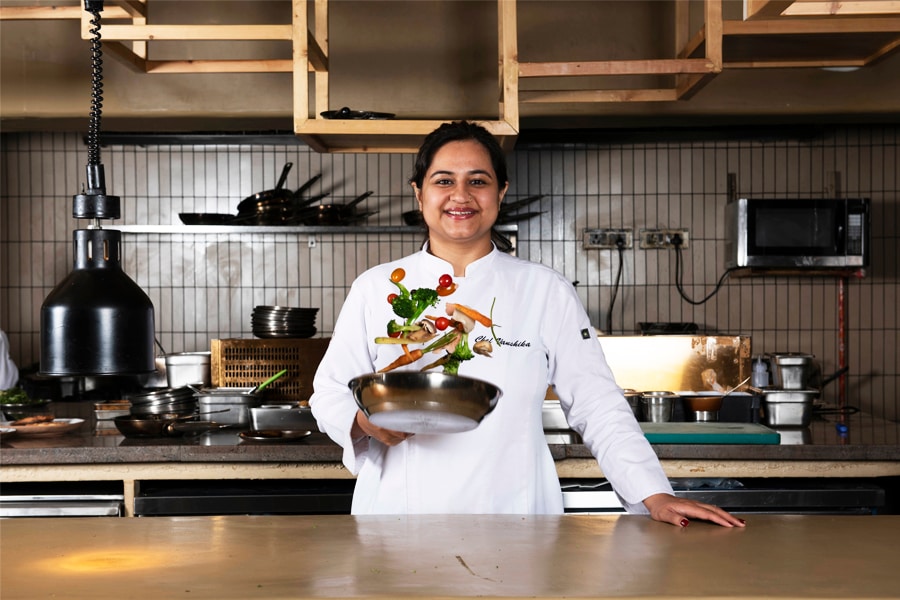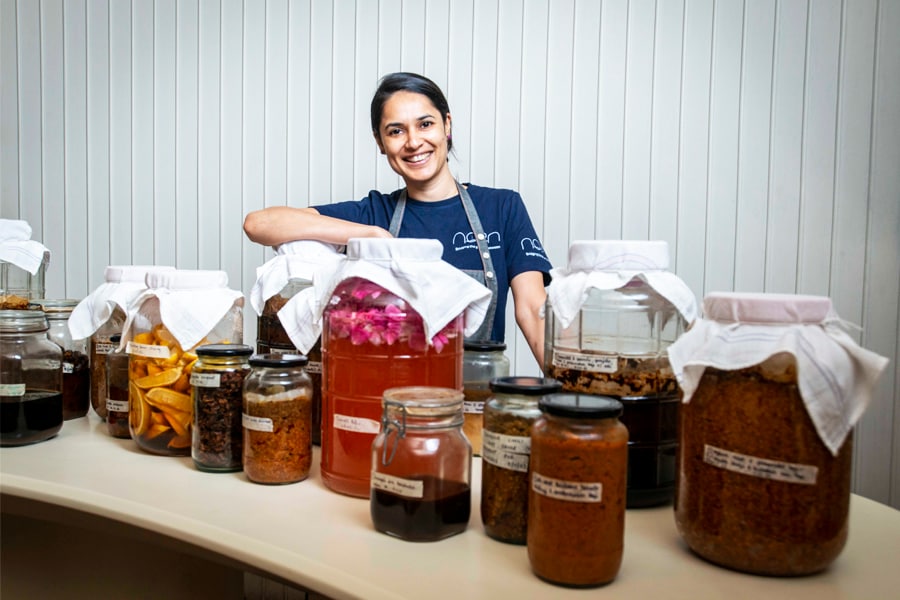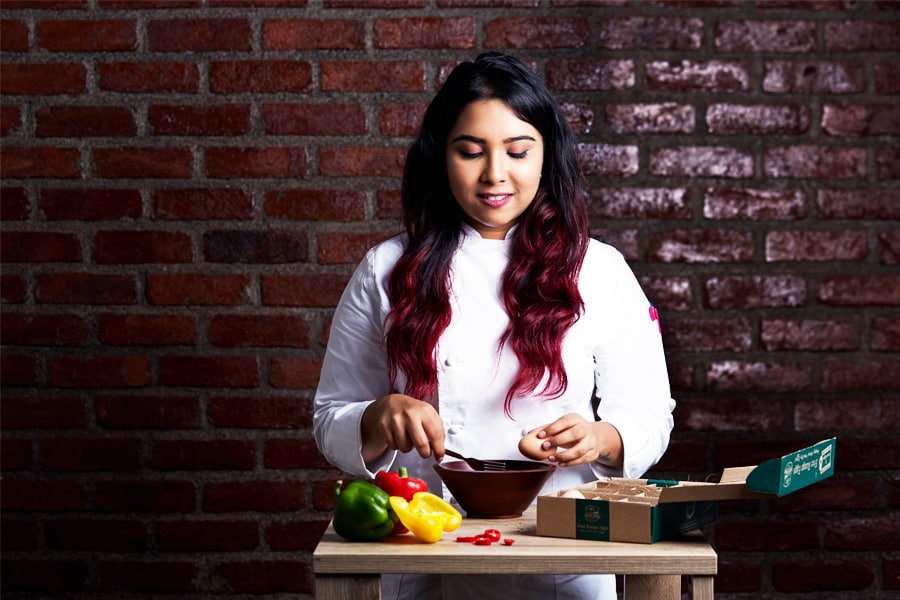A woman's place, in the kitchen
Over the past five years, there's been a marked rise in women leading restaurants and bars across India, workspaces that have traditionally been known to be male-dominated, aggressive environments. It


"I’ve actually had a bartender walk out of my restaurant, because, he said, ‘You’re a woman, what do you know?’"
“A customer said, ‘It looks like your head chef is not here. It would have been better if he were’. I’m the owner and I’ve been at the pass the whole time."
“Once, a co-worker got angry with me and tossed hot soup right at my leg. I was wearing linen pants, and the burn was pretty bad. That’s the first time I felt gendered, that this wouldn’t have happened if I were a man."
These real-life incidents from Indian women who now lead successful food and beverage (F&B) establishments tell a part of the story: It isn’t easy to be a woman in the kitchen—especially as more of them step into the fast-paced hot kitchen.
But thankfully, they say, that’s changing every day. A big reason is because of women like themselves, who are taking the plunge, taking on leadership positions, not only to create great gourmet food, but also to make the restaurant industry safer and more inclusive for women like them.
It’s a dichotomy as old as time—women cook in the home, but men wear the chef’s hats.
According to a 2018 study by Nickeled and Dimed, the official research platform of the Centre for New Economics Studies (CNES), Jindal School of Liberal Arts and Humanities (JSLH), OP Jindal Global University, Sonipat, approximately 10 to 15 percent of chefs in India were women, back in 2018, which means that 85 to 90 percent were men. Interestingly, only about 6.1 percent of men help in cooking in a domestic setting.
A marked distinction has existed between this sort of unpaid skill, and its application in a paid setting. Traditionally, women have not been encouraged to keep the long hours a restaurant kitchen demands, to work in the high-stress environment that often has rude phrases hollered around, or subject themselves to the punishing, hot, meaty parts of the kitchen. The pastry and baking parts of the business are considered more feminine.
However, while official statistics aren’t available, it is anecdotally evident that much of that is changing in India.
“If you look at the percentage of women chefs, it’s still shamefully low. It earlier used to be 5 to 6 percent. Now it"s about 12 to 13 percent. But what"s amazing is whichever new place I"m trying out or hearing about, they all have women—either there are women owners, or there are women chefs running it, and not only in bigger establishments," says Ritu Dalmia, celebrated chef and restauranteur, and one of the first Indian women in the space.
 Chef Vanshika Bhatia of Omo restaurant in GurugramImage: Amit Verma
Chef Vanshika Bhatia of Omo restaurant in GurugramImage: Amit Verma
“There’s a whole breed of chef-entrepreneurs, self-motivated and self-driven women. And I see this happen more in India than in Europe," she adds.
Examples of this new breed of Indian women in F&B include, and are not limited to, in Mumbai, Vanika Choudhary, founder and chef, Sequel and Noon Niyati Rao, chef-partner at Ekaa in Mumbai and Devika Manjrekar, head chef and owner, Toast Pasta Bar and Toast Doughnut Shop. In Delhi-NCR, there’s Vanshika Bhatia, owner and chef-partner, Omo and down south, Divya Prabhakar, founder of the Bengaluru Oota Company.
Today, Dalmia is the co-owner of six restaurants in India, three in Milan in Italy, and she also runs a catering vertical.
She says she doesn’t consider any roadblocks in the early days, because she was determined, and had purposed a thick skin.
“My father didn’t speak to me for six months. My chefs wouldn’t talk to me or look me in the eye because firstly, I was 21, not from a well-known hospitality school, and of course, I was a woman. So finally, I had to tell them that, look, whether you like it or not, I’m the boss," she recounts. “And I’m proud to say that many of those people are still with me."

A big reason for more women to take on chef’s whites is, simply, seeing other women doing it, and being rewarded as such.
“Just to see that someone else can do it gives you a lot of encouragement to take the plunge," says Gauri Devidayal, co-founder of the Food Matters Group, who started her first restaurant, The Table, 13 years ago.
“When I started, there weren’t many women in the space, and one wondered what my future would be," says Vanika Choudhary, founder and chef of the ingredient-focussed Sequel and Noon in Mumbai, adding that Devidayal was a huge source of support to her, as someone who had been there, done that.
“Seeing women’s success stories, women who were claiming their space in the industry, putting India on a global map—that’s been a huge source of inspiration for me. Garima Arora [chef-owner at Bangkok-based Gaa restaurant], for instance, is a close friend and former classmate—she became the first Indian woman to get a Michelin star, and has just got her second star," Choudhary says. “It’s not about the accolades and stars, but stories like hers give us hope."
It’s important, she adds, that women talk openly about what it takes to make a mark—that yes, it is challenging, but also that it’s worth it, and that each profession comes with its own set of obstacles. “Being a homemaker is so challenging too," she says.
 Chef Vanika Choudhary at Noon restaurant in Mumbai Image: Bajirao Pawar for Forbes India
Chef Vanika Choudhary at Noon restaurant in Mumbai Image: Bajirao Pawar for Forbes India
Vanshika Bhatia of farm-to-table restaurant Omo in Gurugram also says that Arora has been instrumental in her success she first met Arora on a stint at the legendary Noma, Copenhagen, and a few years later, received an opportunity to work at the famed Gaggan in Bangkok, where Arora was working at the time. She eventually returned to India in a few months because of visa issues, joining the Olive Group as head chef of Ek Bar in Delhi, before starting her own restaurant, Together at 12th, which shuttered in the second Covid-19 lockdown. Bhatia now has two ventures—she opened Petite Pie Shop two years ago (one outlet in Delhi and the other in Gurugram), and is the chef-partner at Omo (in Gurugram).
“I’ve always been one of just two or three women in the kitchen," Bhatia says. “In Copenhagen, there were quite a few women, but I’ve worked in Dubai and India, and the percentage of women chefs has always been very low. But now, with a few women chefs doing so well and being treated as celebrities, I’m seeing that families are more encouraging of their girls pursuing the career."
The work hours are still long, she adds, leading to a limited social life. “But the more hours you spend, the better you get, and the more trust you gain," Bhatia says. “Chefs can earn very well, but only if you show initiative. People want chefs to speak up and be presentable, know about what they"re doing, find out ingredients, do social media—there’s a lot more to being a chef now than there was earlier, when you were behind the scenes."
The issue of being taken seriously as a woman persists, however.
“Chefs who have been working with me for a while now stick around for years, but I do see that new people who come in, especially those in senior positions with more years of experience, have a difficult time taking orders from me," says the 30-year-old. “A lot of ego clashes happen, and they leave eventually—and I don’t stop them. I don’t think this problem is going away soon. I always know that I have to prove myself."
Most women who apply for jobs, Dalmia says, want to work in pastry.
“And I politely tell them that because you say that, I’m going to offer you an opportunity in the hot kitchen, and let me know if you are up for it," she says.
“There was a wave of women pastry chefs in India [around the early 2010s], which did inspire a lot of us," adds Manjrekar, chef-owner of Toast Pasta Bar and Toast Doughnut Shop. “Pastry is more technical, and in many ways, a lot less stressful—it takes away the mania of service, for instance."
Manjrekar, like many other women, started out wanting to be a pastry chef, and studied at Le Cordon Bleu in London. “But then I realised that it wasn’t all I wanted to do. I wanted to experience the hot side of things," she says.
However, her first few experiences weren’t great—she found that work environments were toxic, hygiene conditions weren’t great for staff, there was a general mindset about what kind of work women would be given, and safety was a concern.
“You know, if someone has brushed up against you, you don’t know if it was a mistake—and that’s not a good place to be," Manjrekar says. “If you decided to put on makeup, there would be comments. One of my mentors had always said, ‘Look like a woman, dress like a woman, and then kill it in the kitchen’. You shouldn’t have to feel like you need to look and feel like a man to be taken seriously."
 Chef Devika Manjrekar of Toast Pasta Bar and Toast Doughnut Shop in Mumbai
Chef Devika Manjrekar of Toast Pasta Bar and Toast Doughnut Shop in Mumbai
Manjrekar has gone the extra mile—both her kitchens currently are 100 percent female.
“I’m very proud of that, because I wish I had that when I started," she says. “I also interview men, but if I have an equal CV that’s female, I’ll go with the woman."
Having more women in the kitchen does generally change its culture, Manjrekar says. “Women are generally more empathetic, especially to other women’s issues. So if someone is on their period, they’ll say, you sit down, I’ll take care of that. There’s a lot of respect for each other."
Social media, she adds, has been another huge enabling factor for women chefs.
“It’s a cliché, but it really does allow you to put your work out there and be judged purely for it," she says. “It really helps to build a following on Instagram, for instance, before launching a business. Now you have a ready audience."
Moreover, the MeToo movement created awareness around what was acceptable in the workplace and what wasn’t—and social media gave women a platform to hold others accountable.
“A big change is just the realisation that you don’t need to take abuse or ‘earn your stripes’. Social media plays a huge role in propagating that. It isn’t easy to go to the police if you feel like something at work was inappropriate, but social media gives you that voice," says Manjrekar. “And now, I know a lot of chefs and restaurant owners who truly want to make the kitchen a better place for everyone."
Divya Prabhakar started Bengaluru Oota Company in her 40s, from a passion to champion regional, homestyle food. Since a lot of this is prepared by women, she works actively to platform them.
“This venture, for me, has always been about also creating impact in a sense. So I wanted to work with women who have the skill set, but don’t necessarily know that this skill can give them opportunities beyond being home cooks," she says. “So I started building a team with women who knew the local flavours, and had cooked within the palate I was looking for. I’m happy to say that many of these women are now confident human beings who run their families, definitely more independent financially than they were when we started out."

Generally speaking, women have an instinct for, and are groomed to be naturally hospitable. This should be treated as an advantage in the business of hospitality.
“You’ll see that women are broadly more meticulous," says Niyati Rao, chef-partner at Ekaa. “We certainly do need to work harder to prove ourselves, as in the past, many women before us have quit the business because of family reasons. But today, many liberal households see a more equitable share of domestic responsibilities between partners, so we are able to go out there and prove ourselves."
Rao says that she has pleaded with her female counterparts not to leave when things get hard, but to push through to bring change. “It starts with the smallest steps," she says. “And people often forget that men do leave jobs too!"
In some ways, being a woman in power in a male-dominated universe can also have its advantages.
“I think it did, in fact, open certain doors for me," Devidayal of Food Matters says. “For example, I’ve always noted how I was able to get a seat on the NRAI (National Restaurants Association of India) managing committee sooner, because they needed representation from women. I jumped the queue in that sense. You have to take the wins with the losses."
Over the years, research shows that women in corporate leadership positions have had to work doubly hard and sometimes also embrace the tropes that come with the masculine idea of leadership—including being aggressive, for instance.
“I sometimes find myself questioning why CEOs of big companies feel the need to identify with more masculine traits," says Radhika Dhariwal, director and founder of Passcode Hospitality, which runs restaurants and bars including Ping’s, PCO, Saz and Jamun across the country.
“What’s nice about F&B is that you need to tap into that so-called feminine side—this includes attention to aesthetics, being detail-oriented, being soft with people, being creative. These are massive assets in our industry," she says. “It’s a hard business for anyone to survive in—but it is a fantastic business if you’re passionate about what you can contribute or create. It’s a really exciting time for women to be coming into the industry, because the field is open, and for the Indian market, this is just the beginning."
First Published: Mar 12, 2024, 10:59
Subscribe Now